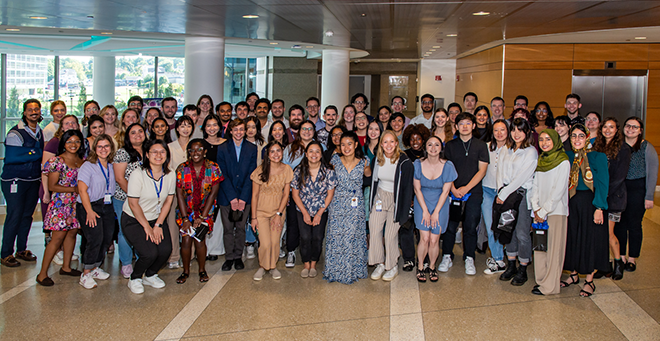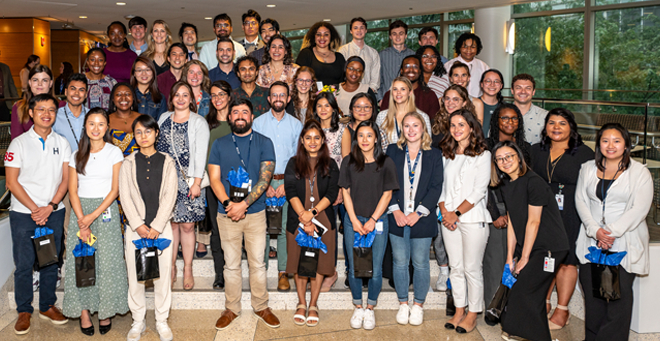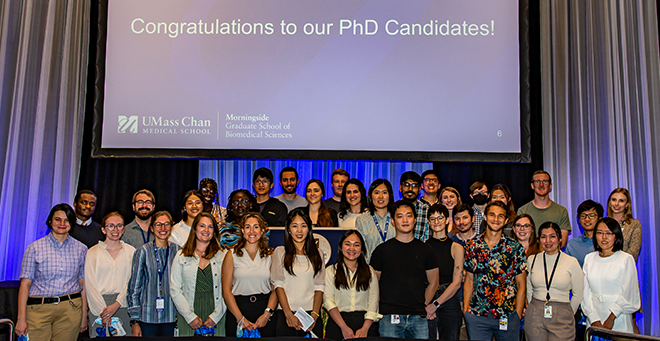
A standing room-only crowd watched as 73 PhD candidates and MD/PhD students in the Morningside Graduate School of Biomedical Sciences at UMass Chan Medical School were recognized on Wednesday, Sept. 11, for passing the exam needed to begin thesis work and transition from student to candidate for a doctoral degree. This is the school’s largest qualifying class.
“With the passage of this milestone, your roles have evolved. You’re no longer just students. You’re actually scholars that are shaping the future of the institution in a broader scientific community,” Mary Ellen Lane, PhD, the Donna M. and Robert J. Manning Chair in Biomedical Sciences, professor of neurobiology and dean of the Morningside Graduate School of Biomedical Sciences, told the honorees during the 2024 Qualifying Exam Recognition Ceremony.
PhD candidates Zhané Adamson, Emma Austen-Holt, Trang Ho and Jessica Peura received the Zelda Haidak Award in Cell Biology. The late Gerald Haidak, MD, established the scholarship before his death to honor his wife, Zelda Haidak, and to enhance training for women launching research careers in cell biology.
Adamson, who is studying in the lab of James B. Munro, PhD, associate professor of microbiology, is focused on how the antiviral effector protein interferon-induced transmembrane protein 3 (FITM3) prevents HIV infection. Austen-Holt is studying mutations in membrane-spanning 4-domains, subfamily A (MS4A), in the lab of Paul L. Greer, PhD, assistant professor of molecular medicine.
Ho studies cell biology processes in a pathogenic bacteria Streptococcus pneumoniae, the leading cause of pneumonia and other life-threatening conditions such as meningitis, in the lab of Josué Flores Kim, PhD, assistant professor of biochemistry & molecular biotechnology. Peura is working on deleting a specific gene in a pancreatic cancer mouse model in the lab of Jason Pitarresi, PhD, assistant professor of medicine.

MD/PhD student Madison Marasco receives a laser pointer from Mary Ellen Lane, PhD.
Madison Marasco, a Wellesley local who graduated from Clemson University with a degree in biology and a minor in microbiology, is one of the MD/PhD students who was recognized. Working with mentor Mark Johnson, MD, PhD, the Maroun Semaan Chair in Neurosurgery, chair and professor of neurological surgery and senior consulting vice provost for mentorship, leadership and transformation, Marasco is researching meningioma, the most common primary intracranial tumor in adults.
“I am particularly interested in identifying what molecular pathways these tumors rely on to survive and understanding if these pathways can be targeted for therapeutic benefit,” Marasco said.
Emmanuella Asiedu, MPH, came to UMass Chan and the Population Health Sciences Pathway after growing up in Ghana and Senegal. She majored in environmental science at Northern Kentucky University before earning a Master of Public Health degree from the Brown University School of Public Health. Mentored by Jennifer Tjia, MD, MSCE, professor of population & quantitative health sciences, and Sarah Forrester, PhD, assistant professor of population & quantitative health sciences, Asiedu is researching how structural factors such as neighborhood resources impact health outcomes among people with type 2 diabetes and the roles that self-identified race and depressive disorder status play in these relationships.
“Being surrounded by kind people is really important to succeed in a PhD program,” Asiedu said. “The students, faculty and staff in the Population Health Sciences program have really felt like a family.”
Leo DeOrsey, a PhD candidate in the lab of Paul Thompson, PhD, professor of biochemistry & molecular biotechnology, who majored in clarinet performance and biology at Rhode Island College, applied to UMass Chan’s Basic Biomedical Sciences Umbrella Pathway after working as a research technician for Scot Wolfe, PhD, professor of molecular, cell & cancer biology. DeOrsey is focused on understanding the mechanisms that drive the pathological neuron degeneration in disorders such as amyotrophic lateral sclerosis (ALS), Alzheimer’s disease, traumatic brain injuries and peripheral neuropathies.
“To me, officially becoming a PhD candidate means that we are dedicated to the process and share a passion for working together to advance the science that contributes to human health,” DeOrsey said.
The following students became PhD candidates in academic year 2023-2024:
Zhané Adamson, James Munro lab
Rakeyah Ahsan, Brian Kelch lab
Favour Akabogu, Matthew Hemming lab
Prajakta Ambegaokar, Allison Keeler-Klunk lab
Krishna Anand, Brian Kelch lab
Rebekka Anderson, Mark Alkema lab
Aditya Ansodaria, Erik Sontheimer and Jonathan Watts labs
Motahareh Arjomandnejad, Allison Keeler-Klunk and Terence Flotte labs
Emmanuella Asantewaa Asiedu, Jennifer Tjia and Sarah Forrester labs
Emma Austen-Holt, Paul Greer lab
Melanie Barbini, Dorothy Schafer and David McManus labs
Brennon Berard, Dohoon Kim lab
Hanbing Cao, Erik Sontheimer lab
Samantha Chigas, Elaine Lim and Rigel Chan labs
Annie Collins, Jonathan Watts and Robert Brown labs
David Cooper, Anastasia Khvorova lab
Mridushi Daga, Jillian Richmond lab
Serena David, William Flavahan lab
Leo DeOrsey, Paul Thompson lab
Brianna Dominguez, Beth McCormick lab
Dylan Doxsey, Kuang Shen lab
Sydney Fischer, Sumeda Nandadasa lab
Elizabeth Flynn, Anastasia Khvorova lab
Yu Fu, Job Dekker lab
Matthew Hanlon, Scot Wolfe lab
Nicolai Hathiramani, Jessica Spinelli and Michael Brehm labs
Nicholas Hayden, Lawrence Stern lab
Trang Ho, Josué Flores Kim lab
Ilina Ivanova, Kuang Shen lab
Christopher Jahns, Josué Flores Kim lab
Alexandra Jerrett, Jessica Spinelli lab
Calvin Johnson, Jason Pitarresi lab
Arshia Kaur, Emma Watson lab
Faith Keller, Emma Watson lab
Manisha Kunala, Jessica Spinelli and Paul Greer labs
Chin Hung Oscar Lam, Jeremy Luban lab
Shiwei (Echo) Liang, Matthew Alcuksy lab
Noah Littman, Shaoguang Li lab
Boyang Ma, Marcus Ruscetti lab
Allison Maebius, Anastasia Khvorova lab
Madison Marasco, Mark Johnson and Rachael Sirianni labs
Katherine Murphy, Marcus Ruscetti lab
Michelle Angelie Narvaez Ramos, Amir Mitchell lab
Sushmita Nayak, Michael Lodato and Robert Brown labs
Adrian Orszulak, Elaine Lim and Rigel Chan labs
Monique Otero, Miguel Sena Esteves lab
Zaipo-Tcheisian Oula III, Silvia Corvera and Kevin Donahue labs
Rebecca Panwala, Erik Sontheimer and Wen Xue labs
Rebecca Pavchinskiy, Andrew Tapper lab
Claudia Perez, Elizabeth Shank lab
Jessica Peura, Jason Pitarresi lab
Lucas Prescott, Craig Mello lab
Shriram Ramani, Fiachra Humphries lab
Pavan Rao, Paul Greer lab
Alejandra M. Rivera Nieves, Accalia Fu lab
Yarimel Rosado, Sarah Whitley lab
Grace Schiefelbein, Phillip Zamore and Li Li labs
Noah Sciambra, Read Pukkila-Worley lab
Carolyn Senneca, Sarah Whitley lab
Emily Sholi, Andrei Korostelev lab
Lauren Shumate, Beth McCormick and Ann Moormann labs
Kylie Sumner, Megan Orzalli lab
Askar Temirbek, Andres Colubri lab
Benjamin Toles, Alan Mullen lab
Khanh Tran, Rigel Chan and Elaine Lim labs
Kim Anh Vu, Jonathan Watts lab
Xinyue Wang, Samuel Behar lab
Brian Wauford, Accalia Fu lab
Gretchen Weaver, Apurv Soni lab
Christopher Woodilla, Sy Redding lab
Ruixuan (Echo) Xiao, Dorothy Schafer and Eviatar Yemimi labs
Wei Zhan, Kate Fitzgerald and Guangping Gao labs
Xuntao Zhou, Wen Xue lab


